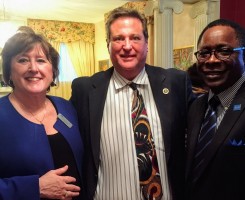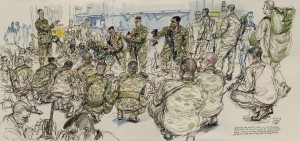Talk about transit is heating up as the population in the fourteen counties that make up the Nashville Metropolitan Area (NMA) grows by an estimated 80 people every day. Nashville is the eighth fastest growing city in the United States and surrounding communities catching the overflow.
Longer Commute Times
With all this growth, you might have noticed the longer commute times. Just eight years ago most people could get from one side of town to the other in about 15 minutes. It is now double. This is but one of the issues that make the transit debate that is heating up in Nashville an important to every resident in the Middle Tennessee area.
Can’t Build Roads Fast Enough
According to Toks Omishakin, Deputy Commissioner/Chief of Environment and Planning Bureau, we cannot solve our problems by building more roads. “[W]e have to think of other ways to get people from one place to another.”
Not only can we not build roads fast enough, but there are already close to 1,000 road projects waiting to be funded.
“We have 78% more traffic now,” said Omishakin, “than we had one year ago.” Just think what the traffic will be like next year.
No Dedicated Transit Plan
It will take a plan to handle this increase in traffic, but Nashville is the only metropolitan area of its size that does not have a dedicated transit plan. What that means is that transit services have been coming out of the General Fund, which is somewhat like the little Dutch boy keeping his finger in the dike to hold back the flood of growth.
According to Mary Elizabeth Ikard, Transportation and Sustainability Manager, Office of Mayor Megan Barry, lite rail can move 16,000 people in an hour, in the same hour cars move about 1,600.
“We need to find a way to get cars off the road,” said Omishakin.
But as officials work to get cars off the road, they will also need to find a way to get people where they need to go, especially to their jobs, in a consistent and timely manner.
Dedicated Transit Means Jobs
Transit also means continued economic development. Currently, the Nashville MSA (metropolitan statistical area, which includes Rutherford County) is third in the nation in job growth, but to continue that growth, employers what to know that their employees can get to work. That is the second question asked by companies looking to move to the area, right behind questions about education.
A strong transit system means more people can get to educational resources, as one of the top two factors in not completing post-high school education is a lack of transportation. The higher the level of education a person receives, the better the job opportunities.
“Research shows that access to transit can mean the difference between poverty and financial independence,” Ikard said.
A better-educated workforce means more high paying jobs coming to Middle Tennessee.
Better Transit Opportunities, Better Land Use
Another factor to consider when talking transportation is the demands of the millennial and baby boomer generations. These two groups make up the bulk of the current population, and they want new ways of living with more access to entertainment, shopping, and other needs like healthcare.
Population density requires better land use and closer access to transit. Boomers and millennials want to be able to walk or bike to many dining and entertainment options, and have quick access to public transport to those needs that are outside of walking distance.
More developments are being created for multi-purposes, containing living, office, and shopping in one area with easy access to entertainment. Transit stations can be built around these high-density housing facilities providing quick access to things like healthcare.
A Healthier Population
Cities with strong transit systems have seen improvement in the health of those who use the facilities because it increases walking. Countries that have had strong transportation systems for generations have lower obesity rates than those with no such programs.
A recent study by the University of Illinois Champagne determined that “higher mass transit use was correlated with lower obesity rates in counties across the United States.” The study, first reported in the journal Preventive Medicine, found that for each one percent increase in a county's population who frequently ride public transit, obesity rates dropped 0.2 percent.
Promotes Livability
Transit planning helps the environment because cars are the number one source of air pollution. Air pollution can irritate the eyes, nose and throat; cause breathing issues; worsen existing lung and heart issues; and increase the chance of having a heart attack according to a study done by the Massachusetts Department of Environmental Protection. It can also affect plants, animals, and even the water supply.
Decreasing the number of vehicles on the road lowers pollution and the effect it has on everything from global climate change and to crop and forest damage.
While helping to heal environmental issues, a healthy transit system also helps to create new opportunities for business development. New dining and entertainment opportunities frequently increase along central thoroughfares, causing populations to not just use transit to get to work, but for pleasure activities also.
Transit Vote In Nashville
On May 1, Nashville voters will go to the polls and vote for or against a dedicated transit plan that will have an immense impact not only on Nashville, but it will pave the way for better movement of people to and from Nashville from the outlying counties – like Rutherford -- that make up the Nashville Metropolitan Area.
This vote will act like a stone thrown into the water, reaching far beyond the core of the city, beyond the surrounding counties, and into the future of the Middle Tennessee area.
For almost 20 years, local politicians have been working to get light rail to Murfreesboro to alleviate part of the burden on I-24.
This plan would create the core transit system from which Murfreesboro and Rutherford County could connect to build a bus and light rail system that would feed directly into downtown Nashville, and 89% of all jobs in the area.













